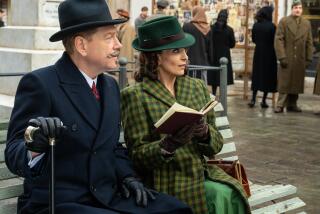TV REVIEW : Branagh, Thompson Team in ‘Anger’
- Share via
No point in mincing words. Jimmy Porter doesn’t. And Kenneth Branagh, who plays Jimmy, with Oscar-winner Emma Thompson as Jimmy’s traumatized wife Alison, packs a wallop in John Osborne’s “Look Back in Anger” (today at 4 p.m. and 11 p.m. on cable’s Bravo channel).
Thirty-seven years after Osborne’s play burst on the London theater scene like a boil, rattling the elitist tenor of British theater, it adapts to the small screen stalwartly undiminished. Proof, once more, if one needed it, that television is a proper medium for the preservation of theater.
“Anger’s” ranting and vituperation may seem excessive at this distance, but the play is a distinct and distinguished product of its time. And in this Renaissance Theatre production, originally staged by Judi Dench and seamlessly transposed to television by director David Jones, Branagh and Thompson are a knockout.
The exasperating quadrangle of Jimmy Porter, his meek upper-middle-class wife Alison, her sniffy friend Helena and Jimmy’s buddy Cliff, constitutes a stark rebuke of England’s Establishment, faltering in the unrest and disenchantment that followed World War II.
If Alison represents the Old Guard, becoming the convenient target of Jimmy’s blistering abuse (symbolic and real), Helena (coldly played by Siobhan Redmond) is upper-class indignation at its most untrustworthy, and Cliff (a warm Gerard Goran) is the oncoming solid/stolid proletariat.
In a swipe of his poisoned pen, Osborne hit a nerve and snagged a moment. When “Anger” was first produced in London in 1956, it provoked a small earthquake.
Prewar colonialism had soured and turned into the postwar churning of angry young men--a label that promptly attached itself to the playwright but, in fact, encapsulated the sharp bend in the road to dramatic social change. Jimmy Porter’s fury heralded nothing more nor less than a real changing of the guard.
Branagh’s Jimmy is relentless, the “spiritual barbarian” with a motor mouth hammering away at Establishment windmills, and yet endowed with enough sensitivity in his more confessional moments to be believable and moving.
Thompson--Branagh’s real-life wife, unrecognizable from the bright award-winning role she played in “Howards End”--is the epitome of unhappiness as the verbally battered Alison: a mousy, silent sufferer, perhaps unconsciously married by Jimmy “for revenge,” who can neither comfortably inhabit his new world nor return to her old one. Her wrenching final exclamation, when she comes back to the husband she tried to leave, is that she’d rather be alive with him and his discomfort than be “dead” by merely existing elsewhere.
That, more than any other statement, characterizes the anguished mass movement and Darwinian accommodations of people everywhere in the last half of this tormented century.
One does not have to scratch this deep to appreciate this production of “Look Back in Anger” as a well-written, kitchen-sink realistic drama, beautifully performed and executed. But that would be only half the story.
That the play comes to us with so much other resonance, is proof that the impulse that spawned it was not accidental. This is not a piece one enjoys so much as savors: an acute, remarkably engrossing study that tells us as much about the strength of the restless human heart as the forces that shape it.
More to Read
The complete guide to home viewing
Get Screen Gab for everything about the TV shows and streaming movies everyone’s talking about.
You may occasionally receive promotional content from the Los Angeles Times.






